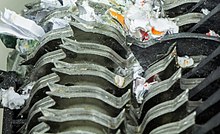Paper shredder
After Colonel Oliver North told Congress that he used a Schleicher cross-cut model to shred Iran-Contra documents, sales increased nearly 20 percent in 1987.More recently, concerns about identity theft have driven increased personal use of paper shredders,[5] with the US Federal Trade Commission recommending that individuals shred financial documents before disposal.Such units may also provide the shredding of CDs, DVDs, hard drives, credit cards, and uniforms, among other things.[citation needed] Navigating the complex landscape of federal regulations for data protection and document destruction is crucial for businesses in maintaining compliance and avoiding penalties.This act ensures that financial documents are handled and destroyed in a manner that prevents unauthorized access and misuse.These laws dictate the storage duration, handling, and destruction methods for legal documents, requiring them to be rendered unreadable or undecipherable.Fair and Accurate Credit Transactions Act (FACTA) - An amendment to the Fair Credit Report Act, FACTA protects consumers from identity theft by providing guidelines on the proper disposal and protection of customer data, including account numbers and social security numbers.Understanding and adhering to these federal regulations is vital for businesses to ensure the secure handling and destruction of sensitive data, thereby safeguarding against breaches and maintaining compliance.Shredders display certain device-specific characteristics, "fingerprints", like the exact spacing of the blades, the degree and pattern of their wear.By closely examining the shredded material, the minute variations of size of the paper strips and the microscopic marks on their edges may be able to be linked to a specific machine.






confidentialinventorAbbot Augustus Lowpatentpasta makeranti-NaziBalingenfall of the Berlin WallGerman Democratic RepublicMinistry for State Security (Stasi)credit cardsU.S. embassy in Iranthe embassy was taken over in 1979Oliver NorthCongressIran-ContraprivacySupreme CourtCalifornia v. GreenwoodFourth Amendmentidentity theftInformation privacyGramm–Leach–Bliley Actscissorsbox truckhard drivesuniformsautomated retailoutsourceconfettilozengeHammermillsNational LotteryUnited StatesNational Security AgencyCentral Security ServiceInternational Organization for StandardizationInternational Electrotechnical CommissionGeneral Data Protection RegulationIran–Contra affairJohn PoindexterHawk missilePaul Volcker CommitteeKofi AnnanOil-for-Food ProgrammeUnion Bank of SwitzerlandHolocaustChristoph MeiliReichsbankDegussaDegeschIran hostage crisiscorporate espionagenational securityWikisourceIranian RevolutionTehranEnron Accounting scandalsDARPA Shredder Challenge 2011All Your Shreds Are Belong To U.S.forensicfingerprintsIndustrial shredderPaper recyclingUsed noteThe Baltimore SunWayback MachineBergier commissionHewlett-PackardPaper engineeringPapermakingHistoryBattle of TalasMissal of SilosCai LunDamjingMatthias KoopsFriedrich Gottlob KellerCharles FenertyThomas Francis CarterDard HunterTsien Tsuen-hsuinAcid-freeAir-laidBananaBlottingBristolCarbonCardboardCardstockCartridgeCoatedConstructionContactCarbonlessCorrectionCotton (rag)CrêpeDisplayElectrical insulationFilterationGenkō yōshiGlassineGreaseproofInkjetIngresKoreanButcherManilaNewsprintOnionskinOrigamiPaperboardParchmentPhotographicPlastic-coatedRed rosinRollingScrittaSecurityThermalTissueTracingTransferTree-freeWallpaper